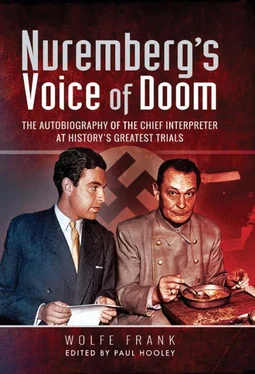‘Why that’s easy,’ he said. ‘Sign for him and take him with you.’
Diels was told to be ready the following morning but not where he was going. I signed a piece of paper stating my name and rank and that, ‘I had received one prisoner, Rudolf Diels.’
I then took him back to my billet in the Oeynhausen compound. This was, of course, monumentally irregular and pleased me enormously since breaking rules was, and still is, one of my favourite pastimes.
We didn’t talk much on the way, but I could see that his face twitched when the gate to the compound was flung open and we drove into yet another camp. His expression changed to incredulity, however, when I took him to a nicely furnished bedroom and told him to make himself comfortable.
‘Come down for lunch,’ I told him, and left him to it.
We were alone at lunch (my two colleagues were off on some assignment) and I noticed that Diels was totally tipsy after a small aperitif. He hadn’t had a drop of alcohol in nearly two years and his stomach was, obviously, rather empty. It had also shrunk, and he ate very little for a day or so, after which he raised his intake by leaps and bounds.
Our conversation centred around the problem of how this unorthodox arrangement between him and me could be continued. I asked him to give me an undertaking not to run out on me. He did, and he kept to it scrupulously.
Then he came up with a list of names of those people who, he thought, would be involved in the administration of the trials at Nuremberg. This was the first time that I discovered his uncanny ability to remember names, situations and to assess people’s characters.
There were, indeed, two names on his list who did eventually turn up at Nuremberg – Dr Robert Kempner, German-born Assistant Prosecutor for the USA, and General William ‘Wild Bill’ Donovan, former head of the Office of Strategic Services (OSS), the USA’s famous cloak-and-dagger outfit. Donovan had been involved in some intelligence activities in Berlin where Diels had met him when he was in the Ministry of the Interior and before he became a Head of Gestapo. Kempner had been in the same Ministry under Wilhelm Frick, the Nazi Minister of the Interior who had thrown Kempner, the Jew, out of the Ministry and Germany. Kempner later had himself assigned to Nuremberg as chief of the prosecution team against Frick, who was hanged.
I got hold of both Kempner and Donovan and found them entirely agreeable to my scheme of bringing Diels to Nuremberg. A request to the British in Bad Oeynhausen to have Diels transferred into US custody was approved and he was picked up from my villa.
The story Diels told me, during a long night, his tongue loosened by Rhine wine and Steinhager (German gin), ran as follows:
He had met Goering’s cousin in Berlin shortly after Hitler had come to power and Goering, who had taken a liking to him, indicated that he would look favourably upon a marriage into the Goering family. The marriage did not last long.
Goering arranged Diels’ nomination as first Chief of Gestapo in Berlin and the Reichstag Fire had happened whilst Diels held that position. However, as he was not a member of the ‘inner circle’ the investigation was taken out of his hands and fabricated charges were brought against van der Lubbe, a young Dutchman, in order to achieve the desired political objective.
As far as they go, Diels accounts of the events of those days may be considered correct and he later wrote a book about his life during the Third Reich, Lucifer ante Portas , which is remarkably analytical so far as these events and the leading figures amongst whom he lived are concerned, but it is almost schizophrenically un-analytical regarding Dr Diels. He did not however claim ignorance of the horrors of the time, only the impossibility for anyone to swim against the monstrous tide. Nor did he – and Kempner and Donovan made certain of this – commit any act of his own that would have made him a guilty contributor.
Goering kept up his patronage of Diels until a grotesque mishap occurred at Karin Hall, the Reichmarshal’s vast hunting domain in Schorfheide. Diels, a keen hunter and an excellent shot had been invited to a boar hunt. Goering was holding court in his capacity as ‘ Reichsjaegermeister ’ a title bestowed upon him as the ‘Supreme Master of the Hunters of the Reich’ which entitled him to wear a variety of uniforms depending on the prey to be pursued, or the season, or the weather, or the time of day.
It was in such a fancy dress that Goering loomed up in front of Diels. To add to the impact, the head of the Luftwaffe was also wearing heavy make-up. ‘ Um Himmels Willen ,’ exclaimed Diels ‘ eine Taucheruniform ? (For heaven’s sake – a diver’s uniform?)’
Goering stared at him for some seconds, then he roared, ‘ Reisen Sie ab’ (leave at once) – and so Diels departed from Goering’s orbit and patronage.
Diels was first sent from the Goering Works into a non-political activity with no future, then he became Government President of Cologne, another job of little consequence, then down another step to Government President of Hanover and finally he was implicated in the attempt on Hitler’s life on 20 July 1944. It was never ascertained how all these demotions were arranged since Diels – as he now had reason to regret – had nothing whatever to do with the assassination plot. What is known however is that Goering, as a last act of generosity for a man he once liked a great deal, had Diels’ name taken off the list of death candidates and he had him sent, instead, to a penal company of the Waffen-SS (the fighting section of the SS) which was being decimated on the Eastern Front. Diels made his getaway from there and had been taken prisoner by the British Army.
As our guest in Nuremberg and as a source of information Diels proved himself to be inexhaustible, infallible and completely accurate. He had a photographic memory as far as channels of command, responsibilities, positions, officeholders, terms of office and organisational charts were concerned. He did however refuse, from the very beginning to the end, to implicate any of his former friends, colleagues or enemies in the Nazi hierarchy. This so angered some of the American prosecutors that at one stage they had him re-arrested – although this was quickly corrected on Donovan’s intervention and another way was found to extract the information from Diels. In other words, someone might have asked Diels if so-and-so had ordered such-and-such an atrocity, and Diels would disclaim any knowledge of such an act. However, if asked if the same man had held the position in question at the time of the crime Diels would answer yes or no.
As long as Diels was in our charge the Germans had no jurisdiction over him and de-Nazification [3] After the war the Allied Powers initiated a comprehensive ‘de-Nazification’ programme. Its purpose was to eradicate National Socialist thought from political, economic, intellectual and cultural life. Nazi laws were abolished and all signs and symbols of National Socialism were removed. The main focus of the programme was the systematic screening of all former members of the NSDAP – party membership was defined as the criteria for their dismissal from executive positions in industry and from public office.
proceedings against him remained suspended. His property near Hanover, a beautiful seventeenth century farmhouse and farming operation had been confiscated by the British and was held by the Property Control Office in Hanover. I went up there with him on one occasion – I was still in uniform and didn’t have to ask anyone’s permission. Diels had telephoned ahead and all his former employees and neighbours kept calling in to see him. It was quite a touching scene. They had prepared a remarkable meal of roast goose and dumplings in his honour, which they knew to be his favourite dish. There was an ample supply of the theoretically non-existent Schnapps and the only person not having a good time was a German Property Control type, who must have felt rather impotent while all this was going on.
Читать дальше












